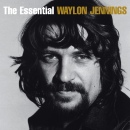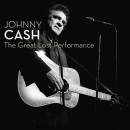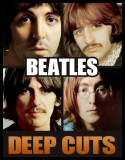Music Home / Entertainment Channel / Bullz-Eye Home
 Buy your copy from Amazon.com
Buy your copy from Amazon.com
| Waylon Jennings: The Essential Waylon Jennings Released: 2007 |
 Buy your copy from Amazon.com
Buy your copy from Amazon.com
| Johnny Cash: The Great Lost Performance Released: 2007 |
The flyer enclosed in The Essential Waylon Jennings reads, “He didn’t become a legend by following the rules.” No, the great Waylon Jennings became a legend by cheating death, trying things others wouldn’t dare, and cranking out a silo full of legendary American country songs. The former bass player for Buddy Holly, who averted tragedy at the age of 22 when he gave up his seat to J.P. Richardson before that fateful plane crash in 1959, went onto unexpected fame as the narrator of “The Dukes of Hazzard” and outlaw companion to Willie Nelson, Kris Kristofferson, and Johnny Cash, A.K.A. the Highwaymen. Jennings finally went kicking and screaming to the other side (notice I didn’t say heaven) in 2002 at the hands of diabetes. Here 42 of his career-spanning best, including a dozen #1 singles, 14 Top 10 hits, and tons of great album cuts get stuffed into the new 2-CD Essential compilation, co-produced by son and Nashville under-classman Shooter Jennings.
It’s all here. “Lonesome, On’ry and Mean,” “Honky Tonk Heroes,” “Are You Sure Hank Done It This Way,” “Good Hearted Woman,” “Luckenbach, Texas,” “Mammas Don’t Let Your Babies Grow Up to Be Cowboys,” even “The Theme from the Dukes of Hazzard.” Essential focuses primarily on Jennings’ tumultuous but rewarding 20-year affiliation with the RCA label. Only the opener “Big Mamou,” which is from his practically-bootleg debut Waylon Jennings at JD’s, and the closer “Rose in Paradise,” his last #1 single, fall outside of the RCA relationship. It’s mind-boggling to think Jennings charted more than 60 albums over 40 years, becoming a gnarly and irritable yet permanent fixture in the country music backdrop.
Seventeen years to the week after Johnny Cash sold out the Paramount Theatre in Asbury Park, New Jersey and turned in a legendary full-band performance with June Carter Cash and others, The Great Lost Performance gets dusted off, re-engineered, and distributed for fans and Cash newcomers alike to admire. The sound quality is surprisingly good, the set list is stellar, and Johnny and June appear playful and almost childish in their between-song banter. June lends her predictably brilliant duet vocal on “Jackson,” while unknown Lucy Clark steps in on a piano-heavy gospel ditty called “What Is Man,” marking the first time Cash had ever played it live. Eighteen tracks in all fill nearly an hour on stage -- not bad for a guy who was nearly 60 years old, grossly unhealthy, and decades from his prime when this classic recording first hit tape. From the “Ring of Fire” opener to crowd favorites “Folsom Prison Blues,” Kristofferson’s “Sunday Morning Coming Down,” and “Hey Porter,” all the way to the final chord of “I Walk the Line,” The Great Lost Performance provides our kids today, who think Brad Paisley can play guitar and Ronnie Dunn has soul, with a not-so-ancient glimpse of what country music used to be. In the years just before Garth Brooks bastardized this glorious genre, Cash was still able to hold a crowd, young and old, in the palm of his rugged, story-telling hand for an entire evening. Oh, how I miss those clackety old railroad ballads.
redrocker@bullz-eye.com






